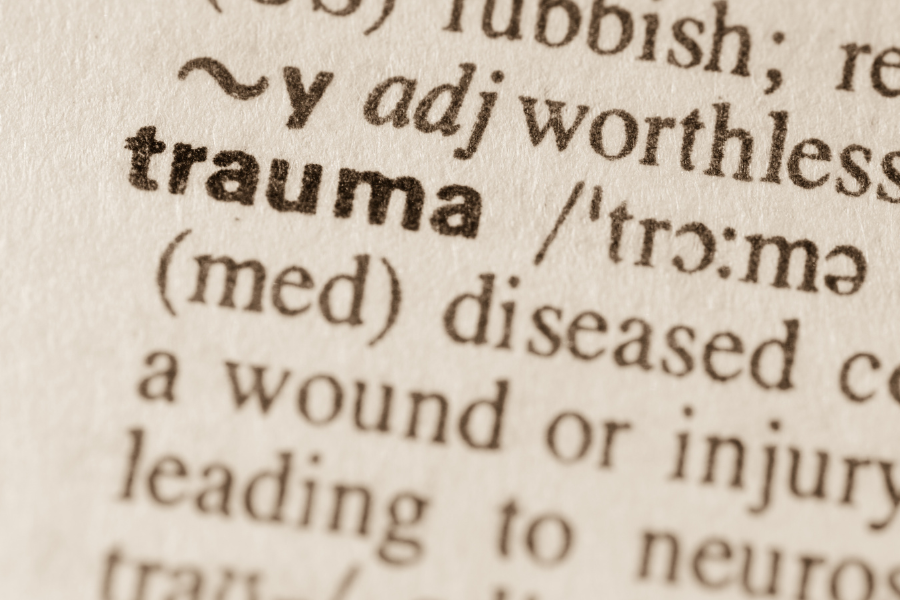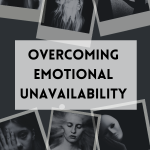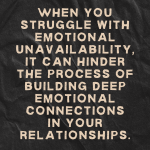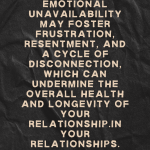When you struggle with emotional unavailability, it can hinder the process of building deep emotional connections in your relationships. It becomes difficult for you to express your emotions or fully commit, leading to a sense of detachment and fear of intimacy. Unfortunately, these behaviors can leave your partner feeling unsatisfied, detached, and frustrated. Communication issues may arise, resulting in misunderstandings and a breakdown in effective dialogue.

The limited emotional support and surface-level interactions can prevent your relationship from reaching its full depth and potential. Ultimately, emotional unavailability may foster frustration, resentment, and a cycle of disconnection, which can undermine the overall health and longevity of your relationship. If you’re looking for ways to keep your relationship strong, take a look at these long-distance tips and inspirational love quotes. As such, it’s crucial to overcome emotional unavailability to form genuine friendships.
What Is Emotional Unavailability?

Emotional unavailability is a complex phenomenon that impacts the capacity to form and sustain deep emotional connections. It involves difficulties in expressing or sharing emotions, often leading to a sense of detachment or distance in relationships. People who are emotionally unavailable may find it challenging to be vulnerable due to a fear of being hurt or rejected.
This fear can be rooted in past experiences, such as trauma or emotional wounds, which have left them guarded and cautious about opening up emotionally. Consequently, they may struggle to establish genuine intimacy and maintain meaningful connections with others.
How Does Emotional Unavailability Affect Relationships?
No emotional intimacy

When you’re emotionally unavailable, it can lead to a lack of emotional intimacy in your relationships. You may find it challenging to express your emotions or be distant when it comes to sharing deeper thoughts and feelings. This can leave your partner feeling disconnected and longing for a deeper emotional connection with you.
Lack of trust

Being emotionally unavailable can pose challenges in building trust within a relationship. When you struggle to open up, share vulnerabilities, or provide reliable emotional support, it becomes difficult for your partner to trust you. This lack of trust creates a sense of uncertainty and instability, impacting the overall foundation of the relationship.
Communication issues

Effective communication is vital for a healthy relationship, but emotional unavailability can impede this aspect of connection. An emotionally unavailable individual may struggle to listen actively, respond empathetically, or engage in meaningful conversations about emotions and personal experiences. This can lead to miscommunication, misunderstandings, and a lack of genuine connection.
Little to no emotional support

When you are emotionally unavailable, it can limit the emotional support you provide to your partner. The inability to offer them emotional comfort, understanding, or empathy can make them feel unsupported during times when they need it the most. Consequently, this can create a sense of isolation and frustration within the relationship, causing strain and dissatisfaction.
Frustration and resentment

Living in a relationship with an emotionally unavailable partner can lead to feelings of frustration and resentment. The partner who longs for emotional connection and support may become increasingly frustrated by the lack of responsiveness and emotional availability from their partner. Over time, this frustration can breed resentment, as they may feel neglected or unimportant in the relationship. The presence of frustration and resentment can create a significant strain on the overall dynamics and happiness within the relationship.
What is Your Subconscious Hiding?
How Can You Overcome Emotional Unavailability?
Develop self-awareness

The first step in overcoming emotional unavailability is cultivating self-awareness. Take the time to reflect on your feelings, past experiences, and behavioral patterns to gain insight into any barriers that may be obstructing emotional connection. This process can involve seeking therapy or engaging in self-reflection practices such as journaling. By actively exploring and understanding your own emotional landscape, you can take the first steps towards overcoming emotional unavailability and fostering healthier, more fulfilling relationships.
Overcome past trauma

Unresolved past traumas have the potential to greatly impact your emotional availability in relationships. It is crucial to seek professional help in order to process and heal from these wounds. By working with a trained therapist or counselor, you can begin the journey of releasing the emotional baggage that may be hindering your present interactions. So, this healing process lets you gradually let go of the past and open yourself up to greater emotional availability and fulfillment in your relationships.
Learn how to build trust

Emotional unavailability often arises from a fear of vulnerability. To address this, focus on cultivating trust, both within yourself and with your partner. Make open and honest communication a priority, establish healthy boundaries, and gradually share deeper emotions and experiences as trust grows between you. By consciously working on building trust and creating a safe space for emotional expression, you can begin to overcome emotional unavailability and foster a more connected and fulfilling relationship.
Cultivate emotional intelligence

Emotional resilience plays a crucial role in navigating vulnerability and the complex emotions that come with intimate connections. It is important to prioritize personal growth by engaging in self-care activities and seeking support from trusted friends or professionals. As a result, you can effectively overcome emotional barriers and create healthier and more fulfilling relationships. Remember that building emotional resilience is a journey that takes time and effort, but the rewards of deeper emotional connections are worth it.
Be open to vulnerability

To overcome emotional unavailability, it is necessary to embrace vulnerability. While it may initially feel uncomfortable, opening yourself up and being vulnerable with your partner creates an environment that fosters emotional connection and growth. By allowing yourself to be emotionally exposed and authentic, you can pave the way for deeper intimacy and a more fulfilling relationship. Remember, embracing vulnerability is a courageous and transformative step towards breaking down emotional barriers and experiencing greater emotional fulfillment in your connections.
Are You An Emotional Psychopath? Answer 15 Questions to Find Out
Overcoming Emotional Unavailability
To form genuine connections with others, whether in friendships or romantic relationships, it is essential to overcome emotional vulnerability. Opening up and allowing ourselves to be emotionally vulnerable is the key to fostering deep and meaningful connections. It requires the willingness to share our true feelings, fears, and desires while embracing the inherent uncertainty and potential for hurt that come with being emotionally open. By taking this courageous step, we create a space for genuine understanding, empathy, and intimacy, laying the foundation for truly authentic and fulfilling connections with others.
If you enjoyed learning about emotional unavailability and how to overcome it, you’ll love these self-help tips that may resonate with your journey:
- Fuel Your Fire: 25 Quotes About Courage To Ignite Your Bravery
- Stress-Reducing Techniques to Restore Balance in Your Life
- Mapping Your Future: Exploring Life Areas for Goal Setting
- 10 Tips On Handling Anxiety: Reclaim Your Life From Stressors











Leave a Reply